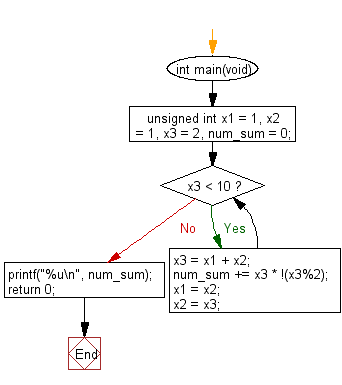C Exercises: Find the sum of the even-valued terms from the terms in the Fibonacci sequence
C Programming Practice: Exercise-18 with Solution
In mathematics, the Fibonacci numbers, commonly denoted Fn form a sequence, called the Fibonacci sequence, such that each number is the sum of the two preceding ones, starting from 0 and 1. That is, and for n > 1. By starting with 1 and 2, the first 10 terms will be:
1, 2, 3, 5, 8, 13, 21, 34, 55, 89, . . .
Write a C programming to find the sum of the even-valued terms from the terms in the Fibonacci sequence whose values do not exceed one million.
C Code:
#include <stdio.h>
int main(void)
{
unsigned int x1 = 1, x2 = 1, x3 = 2, num_sum = 0;
while (x3 < 10) {
x3 = x1 + x2;
num_sum += x3 * !(x3%2);
x1 = x2;
x2 = x3;
}
printf("%u\n", num_sum);
return 0;
}
Sample Output:
10
Flowchart:

C Programming Code Editor:
Contribute your code and comments through Disqus.
Previous: Write a C programming to find the sum of all the multiples of 3 or 7 below 100.
Next: Write a C programming to find the largest prime factor of the number 438927456?.
What is the difficulty level of this exercise?
Test your Programming skills with w3resource's quiz.
C Programming: Tips of the Day
Static variable inside of a function in C
The scope of variable is where the variable name can be seen. Here, x is visible only inside function foo().
The lifetime of a variable is the period over which it exists. If x were defined without the keyword static, the lifetime would be from the entry into foo() to the return from foo(); so it would be re-initialized to 5 on every call.
The keyword static acts to extend the lifetime of a variable to the lifetime of the programme; e.g. initialization occurs once and once only and then the variable retains its value - whatever it has come to be - over all future calls to foo().
Ref : https://bit.ly/3fOq7XP
- New Content published on w3resource:
- HTML-CSS Practical: Exercises, Practice, Solution
- Java Regular Expression: Exercises, Practice, Solution
- Scala Programming Exercises, Practice, Solution
- Python Itertools exercises
- Python Numpy exercises
- Python GeoPy Package exercises
- Python Pandas exercises
- Python nltk exercises
- Python BeautifulSoup exercises
- Form Template
- Composer - PHP Package Manager
- PHPUnit - PHP Testing
- Laravel - PHP Framework
- Angular - JavaScript Framework
- Vue - JavaScript Framework
- Jest - JavaScript Testing Framework
